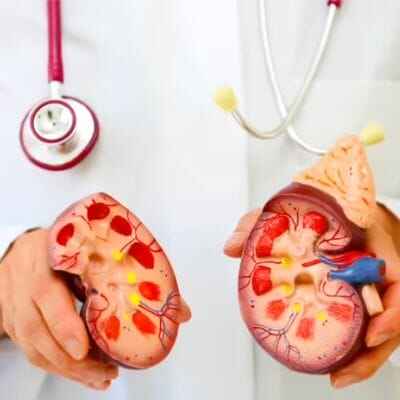What is Kidney Renal calculi ?
Renal calculi, nephrolithiasis, or urolithiasis are solidified deposits of minerals and salts that slowly accumulate in the kidneys. Small renal calculi are hard to diagnose; however, a large renal calculi can cause unbearable pain and can cause lacerations inside the body. Renal calculi treatment in Ayurveda offers potent Herbal medicine for renal calculi that dissolves the calculi completely. Renal calculi treatment in Ayurveda also offers dietary and lifestyle recommendations that are helpful in managing renal calculi.
Book Free Consultation
Causes Of Renal Calculi ?
Renal calculi can be caused by:
- Dehydration
- High-salt diet
- Medications like calcium-based antacids, indinavir, and topiramate
- Medical conditions such as gout, obesity, and diabetes
- Family history
- Urinary tract infections
- A diet low in calcium
Symptoms Of Renal Calculi
- Intermittent flank pain that can vary in intensity
- Discomfort or a burning sensation during urination
- Urine that appears pink, red, or brown, often with a noticeable odor
- Feelings of nausea
- Episodes of vomiting
If you notice any of these symptoms, it's essential to consult a nephrologist for an effective renal calculi treatment. For those seeking a holistic approach, renal calculi treatment in Ayurveda provides a natural and comprehensive solution to manage this condition.
Who is at a Higher Risk?
The primary risk factors associated with renal calculi include:
- Gender: Men are two to three times more likely than women to develop kidney stones, often influenced by a diet high in protein and sugar while being low in fiber.
- Dehydration: Inadequate fluid intake increases the risk of stone formation.
- Family History: A genetic predisposition can heighten the likelihood of developing kidney stones.
- Medications and Supplements: Certain medications and supplements, including vitamin C, laxatives, and calcium-based antacids, may contribute to stone formation.
- Gastrointestinal Surgery: Procedures like gastric bypass surgery can alter calcium absorption and increase stone risk.
- Kidney Infections: Recurrent infections can lead to changes in the urine composition that promote stone development.
- High Fructose Intake: Diets high in fructose can increase the risk of kidney stones.
- Exercise Habits: Both excessive and insufficient physical activity can affect kidney health; overexertion can lead to dehydration, while inactivity can lead to weight gain and metabolic changes.
How To Diagnose Renal Calculi
Renal calculi are diagnosed through the following methods:
- Medical History and Physical Examination: A thorough assessment of the patient's medical history, along with a physical examination, helps identify risk factors and symptoms.
- Urine Tests: Analyzing urine samples can detect the presence of stones and assess kidney function.
- Blood Tests: Blood tests help evaluate kidney function and identify any underlying conditions that may contribute to stone formation.
- X-ray: Imaging through X-rays can reveal the presence of larger stones in the kidneys or urinary tract.
- CT Scan: A CT scan provides detailed cross-sectional images of the kidneys and urinary tract, allowing for accurate detection of stones.
- Intravenous Pyelogram (IVP): This imaging test involves injecting a contrast dye into a vein, which highlights the urinary tract on X-rays, helping to identify blockages or stones.
Complications Of Renal Calculi
Untreated renal calculi can result in:
- Kidney Infection: An infection in the kidney due to blockage.
- Permanent Kidney Damage: Prolonged obstruction can lead to irreversible damage.
- Chronic Kidney Disease: A progressive loss of kidney function over time.
- Urine Build-Up: Accumulation of urine in the body can cause various complications.
- Abscess Formation: The development of pus-filled pockets in the kidneys.
- Hydronephrosis: Swelling of the kidneys due to urine retention.
- Pyelonephritis: A severe kidney infection that can arise from untreated stones.
- Pyonephrosis: A condition where pus fills the renal pelvis due to infection.
Renal Calculi Treatment in Ayurveda
Renal Calculi Treatment in Ayurveda offers a holistic approach to managing renal calculi. Ayurveda identifies specific herbal medicines that effectively dissolve renal stones within the body. Certain herbal remedies also assist in breaking down larger calculi into smaller fragments, facilitating their elimination through the urinary system. Alongside these herbal treatments, Ayurveda emphasizes the importance of lifestyle modifications, which may include dietary adjustments, exercise, and other practices aimed at enhancing overall renal health.
Herbal Medicine For Renal Calculi
Herbs used to treat renal calculi in Ayurveda:
- Varuna: Varuna is a powerful herbal medicine for renal calculi with anti-lithiasis properties, effectively breaking down kidney stones into smaller fragments. It also helps prevent the formation of oxalates, a major component of calcium oxalate stones.
- Pashanabheda: This herb aids in breaking down renal calculi into smaller pieces, facilitating their smooth expulsion from the kidneys. Additionally, Pashanabheda alleviates pain and inflammation associated with kidney stones, making it one of the best herbal medicines for renal calculi.
- Gokshura: Known for its diuretic and anti-inflammatory properties, Gokshura enhances renal function and helps inhibit the formation of kidney stones.
- Punarnava: With its diuretic properties, Punarnava promotes healthy urine flow, regenerates kidney tissues, and reduces inflammation in the renal cells.
In addition to taking the best herbal medicines for renal calculi, it’s essential to incorporate renal-friendly lifestyle changes to support your treatment. Here are some tips for improving overall kidney health:
- Stay Hydrated: Aim to drink at least 8-10 glasses of water daily. Staying well-hydrated can help prevent the formation of renal calculi and improve kidney health.
- Limit Salt Intake: A low-sodium diet can reduce the risk of developing renal calculi, which are formed from hardened deposits of salts and minerals. This approach also aids in blood pressure control.
- Limit Protein Consumption: Reduce your intake of animal-based proteins, such as meat and fish, as high consumption is linked to kidney stone formation. Consider plant-based protein sources like legumes, tofu, and nuts, but consult your doctor before making dietary changes.
- Maintain a Healthy Weight: Regular exercise can help you maintain a healthy weight and decrease the likelihood of renal calculi. Physical activity also strengthens the immune system, protecting against kidney infections.
- Avoid Caffeine and Soda: Caffeinated and carbonated drinks can harm kidney health. Opt for herbal teas, such as green tea, chamomile, or hydrangea tea, to support renal function.
- Practice Yoga: Asanas like Cobra Pose, Camel Pose, Wind-Relieving Pose, Leg-Up Pose, and Bow Pose are effective for kidney health. Ensure you practice under the guidance of a certified yoga instructor.
- Include high-fiber foods like broccoli, prunes, and vegetables in your daily diet to support renal health.
- Consume low-potassium foods such as apples, cauliflower, peppers, grapes, and strawberries to maintain kidney function, especially if you have kidney issues.
- Incorporate green leafy vegetables, citrus fruits, and berries into your meals to promote overall kidney health.
Renal calculi can be troublesome, and larger stones can pose serious health risks. Early treatment is crucial to prevent complications associated with kidney stones. If you suspect you have renal calculi, consult a nephrologist for the most appropriate treatment options.
Why Choose Ayuraura ?
Ayuraura is one of the leading Ayurvedic hospitals in the country, specializing in the treatment of renal stones. Our approach utilizes potent natural herbs that have been proven effective in completely dissolving renal calculi. In addition to herbal remedies, we provide guidance on dietary and lifestyle changes to ensure patients achieve lasting relief from renal stones and enhance their overall renal health.


